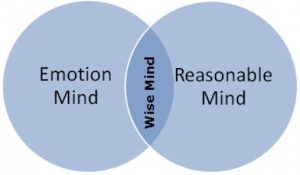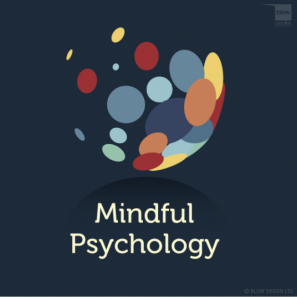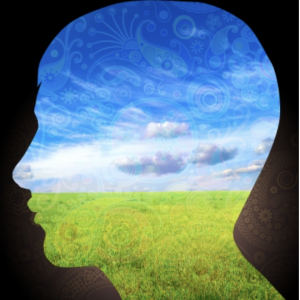The Balanced Mind
Psychology Clinic
Bianca Glajz
Bianca has a calming, light-hearted and non-judgemental therapeutic approach. Her warm, genuine and accepting nature puts clients at ease and provides a safe and supportive space for working through difficulties. Bianca is passionate about her work with clients and dedicates herself fully to getting to the root causes of the client’s issues and identifying each individual’s best path to healing and resolution. She helps her clients gain insight into their difficulties and guides them through the process of making positive, long-standing change and transformation.
The therapy work with Bianca is always very practical, focused on teaching new skills and methods for dealing with one’s emotions, thinking patterns and behaviour patterns. At the same time, Bianca’s work involves powerful processes for uncovering, releasing and healing emotions, as well as guided introspection to experience profound breakthroughs and new perspectives of balance. Through these therapy processes, changes to problematic and self-defeating behavior patterns result and more healthy and productive actions start to grow.
Bianca’s ultimate goal with each client is to help them develop greater self-acceptance and understanding, become empowered, inspired and in control of their life, and find authentic happiness.


Bianca Glajz
Bianca has a calming, light-hearted and non-judgemental therapeutic approach. Her warm, genuine and accepting nature puts clients at ease and provides a safe and supportive space for working through difficulties. Bianca is passionate about her work with clients and dedicates herself fully to getting to the root causes of the client’s issues and identifying each individual’s best path to healing and resolution. She helps her clients gain insight into their difficulties and guides them through the process of making positive, long-standing change and transformation.
The therapy work with Bianca is always very practical, focused on teaching new skills and methods for dealing with one’s emotions, thinking patterns and behaviour patterns. At the same time, Bianca’s work involves powerful processes for uncovering, releasing and healing emotions, as well as guided introspection to experience profound breakthroughs and new perspectives of balance. Through these therapy processes, changes to problematic and self-defeating behavior patterns result and more healthy and productive actions start to grow.
Bianca’s ultimate goal with each client is to help them develop greater self-acceptance and understanding, become empowered, inspired and in control of their life, and find authentic happiness.
Qualifications & Experience
Bianca has a Masters in Clinical Psychology and specialised training in several evidence-based psychological therapies, including Cognitive Behaviour Therapy, Acceptance and Commitment Therapy, Dialectical Behaviour Therapy, and Interpersonal Psychotherapy. She has undertaken training from various leaders in the field, including Dr Sarah Edelman, Dr Russ Harris, Dr Marsha Linehan, Dr Rick Hanson, and Dr Robert Leahy, to name a few. Bianca has a strong interest in meditation and other innovative modalities, such as Emotional Freedom Techniques, Positive Psychology, Somatic Psychotherapy, and Strengths-Based Therapy, which informs and enhances her clinical approach.
Bianca has experience working with adolescents and adults in a variety of mental health settings across Sydney, including outpatient services at Royal Prince Alfred Hospital and the Adolescent Services at Prince of Wales Hospital, on inpatient programs at St John of God Hospital and The Sydney Clinic, as well as in private practice in the eastern suburbs.
Registrations


Services
– Individual face-to-face sessions
– Telehealth sessions available
– Saturday appointments available
– Medicare and private health fund rebates available
At The Balanced Mind Psychology Clinic, Bianca offers individually tailored psychological treatment for adults and adolescents with the following difficulties:
– Anxiety & Phobias
– Anger management
– Addiction problems
– Bipolar Disorders
– Body Image issues
– Borderline Personality Disorder
– Bullying
– Depression
– Eating Disorders
– Emotional Instability
– Grief and Loss
– Health-related difficulties
– Life Transitions & Adjustment Issues
– Life Coaching and Self-Development
– Panic Attacks
– Post Traumatic Stress Disorder
– Self-esteem issues
– Self-harm and Destructive behaviours
– Social Anxiety
– Stress Management
– Obsessive-Compulsive Disorder
– Trauma
– Relationship and Interpersonal difficulties
– Weight management difficulties
– Worry and Generalised Anxiety
FAQs
What is Bianca's approach to therapy?
Psychological therapy is a very individualised process that has to be tailored for each person’s specific needs, issues, current set of life skills, and personal preferences.
Often there are specific treatment approaches that work best for certain issues and at other times combining techniques from different approaches can also bring successful outcomes.
At the Balanced Mind Clinic, each client goes through a thorough assessment process in order to work out the best approach for their difficulties and will receive therapy tailored specifically for them.
Who can benefit from therapy?
Therapy is suited for clients with diverse needs and goals.
– Therapy is effective for those looking for treatment for known psychological problems and issues that have been negatively impacting their functioning in life, work, relationships, and sense of self, or negatively impacting their emotions, self-esteem, and wellbeing.
– Therapy is also effective for those looking for self-improvement, growth, and a more enriched and satisfying life. For those who wish to develop more skills and knowledge for creating positive change, access new perspectives, and gain more balanced emotions and states of mind.
– Therapy is also very effective for those who seek healing on long-standing issues and wish to heal the past and need help to make changes to unhelpful and problematic behaviour and thinking patterns that cause them suffering. Therapy is an essential part of healing and overcoming those most burdensome life challenges. It is a process for transforming one’s life and self for the better, letting go of the past, and moving forward.
What is Cognitive Behaviour Therapy (CBT)?
CBT is a logical and practical approach to help with a wide range of emotional and behavioural problems. CBT is well supported by scientific research as being an effective treatment for anxiety disorders, phobias, Obsessive-Compulsive Disorder, PTSD, depression and mood problems, anger management, eating disorders and weight management problems, addiction, and distress associated with medical conditions.
CBT is based on the view that the way you think and act affects how you feel. CBT focuses on identifying and modifying unhelpful and problematic thinking patterns and behaviours that cause emotional problems and teaches skills for changing your thinking and learning new healthier behaviours and habits.
CBT requires clients to play an active self-help role in their treatment and focuses on teaching skills and methods to clients to resolve their current symptoms but also to provide useful tools for dealing with future problems. CBT is a goal-oriented and time-limited treatment approach that focuses on problems in the here and now, rather than focusing on the origins of problems or delving into the past.
What is Dialectical Behaviour Therapy (DBT)?


DBT is a skill-building therapeutic approach developed for people who have difficulties regulating their emotions and behaviours, and engage in behaviours that disrupt their lives.
It was originally developed to treat Borderline Personality Disorder and complex individuals who have chronic suicidal thinking and engage in high-risk behaviours. However, today we know that DBT has proven to be effective for a wide range of psychiatric disorders, including depression, anxiety disorders, substance abuse, and eating disorders, and any issues that involve significant emotion coping difficulties.
DBT is a suitable treatment approach for the following problem areas:
- Emotional dysregulation – intense, chaotic, unstable or over-controlled emotions and high emotional sensitivity
- Chaotic, unstable and conflictual interpersonal relationships
- Impulse control problems
- Depression and anxiety
- Destructive behavior patterns
- Self-harm, such as cutting
- Suicidal ideation, urges, and attempts
- Issues related to trauma
- Self-esteem issues
- Emptiness and undefined sense of self
- Substance abuse
- Disordered eating
- Difficult-to-change behaviours
DBT is a powerful, behaviour-focused modality that aims to teach clients practical coping skills to address their specific problem areas. DBT combines traditional CBT with techniques such as mindfulness and acceptance, which are often associated with newer or “third wave” behavioural strategies. Thus DBT focuses on teaching people skills for change, as well as these extra techniques that teach people how to radically accept unchangeable problems and how to become effective at riding out and letting go of painful emotions and destructive urges.
DBT skills training targets four skill sets, including mindfulness, distress tolerance, emotion regulation and interpersonal effectiveness.
Mindfulness skills: Help people learn how to accept and sit with difficult thoughts and feelings without needing to react or struggle. Mindfulness increases clarity and awareness of ourselves, reduces emotional reactivity, and enriches our day-to-day life experience.
Distress Tolerance skills: Help people learn how to tolerate difficult situations skillfully, get through emotional crises without making things worse, and how to develop more emotional resilience.
Emotion Regulation skills: Help people learn how to manage and change emotions that you want to change and how to increase your experience of positive emotions.
Interpersonal Effectiveness skills: Help people learn how to increase effectiveness in dealing with other people and relationships, and how to build more self-respect. These skills will improve assertiveness, boundary setting, your ability to express your needs, and help you develop a more positive relationship with yourself.
What are mindfulness-based psychological approaches


There are a growing number of psychotherapies that integrate Western and Eastern psychology and include mindfulness and meditation skills training. These therapies include the best of Western and Eastern psychological principles and techniques for gaining insight into our mental, emotional and behaviour patterns, becoming more emotionally balanced, experiencing more self-compassion, and learning how to let go of unhelpful thinking and behaviour patterns.
What is Acceptance and Commitment Therapy (ACT)
ACT is one of these mindfulness-based psychology approaches. ACT is a scientifically-proven therapeutic approach for treating a range of problems, including depression, anxiety, addiction, self-harm, weight management and eating disorders, chronic pain and stress management.
This therapy approach has two broad goals. First, to help clients experience more acceptance of the things that are out of their personal control. This involves teaching clients various skills that will help them to allow painful or difficult feelings, thoughts or memories to be there without getting caught up in them, struggling with them, getting overwhelmed by them and negatively influencing their behaviour and their life, and how to let these go.
The second main goal of ACT is to help clients discover and/or clarify their values – i.e. get clear on what they want their life to be about and what is meaningful and important to them. This process of gaining insight into your self and your values will be used to guide, inspire and motivate the course of action and changes to be made in therapy and beyond. This will help clients to get clear in their life vision and commit to actions that will improve and enrich their life.
What is Mindfulness-Based Cognitive Therapy (MBCT)


MBCT was specifically designed to help people who suffer repeated bouts of depression and chronic unhappiness. However, MBCT has also been shown to be an effective treatment for other difficulties, including chronic and acute stress, anxiety disorders, and chronic pain and illness.
MBCT integrates techniques from cognitive therapy with mindfulness meditative practices and teaches a mindful approach towards your thoughts, feelings, moods, behaviours, and experiences in your outer life. It helps clients see their patterns of mind more clearly and to develop the capacity to allow distressing emotions, thoughts and sensations to come and go without having to battle with them. MBCT helps clients to stop patterns of ruminating about the past, excessively worrying about the future, and stop reacting so intensely to things, and instead to become skillful at staying in touch with the present moment.
